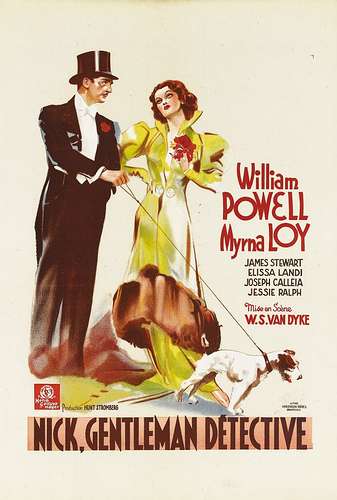Gentleman Detective
Subtrope of Great Detective. A sleuth who is known to belong to the higher strata of society - to have been raised in a privileged environment, and shows it, even if they have since rejected their background. Will tend to be some form of polymath, possibly autodidactic, at the least being very well-educated and well-read. Probably multilingual to boot, and often has notable eccentricities or unusual hobbies. Frequently a competent musician. Like the Great Detective, this was first instantiated in the form of Edgar Allan Poe's C. Auguste Dupin, and popularised by Arthur Conan Doyle's Sherlock Holmes.
The Other Wiki has a page on this trope. See also Mystery Fiction and Detective Fiction.
Examples of Gentleman Detective include:
Comic Books
- Some versions of Batman, particularly those that lean toward the idealism end of the scale.
Literature
- Edgar Allan Poe's C. Auguste Dupin came from a wealthy family, although he had been reduced to a more humble lifestyle. Holds the rank of Chevalier (Knight) in the Légion d'honneur. Likes hieroglyphs. Can spell ratiocination.
- Arthur Conan Doyle's Sherlock Holmes is often seen to be the quintessential Gentleman Detective. Although Doctor Watson is more stereotypically upper class than Holmes, Sherlock is still a man of some means, and is nothing if not knowledgeable, particularly on chemistry and sensational literature. Retires to become a beekeeper, of all things.
- Actually, Holmes acted very upper class (with country squires and French artists in his bloodlines), and Victorians would have recognized this. Not so noticeable these days, because he doesn't always come off as the modern idea of a Victorian gentleman. Watson was very much the gentlemanly middle class. Both men being the younger sons in their families, they would have had to work for a living, however, no matter their families' financial circumstances.
- Dorothy L. Sayers' Lord Peter Wimsey is another archetype. Younger brother of a duke, he was educated at Eton and Oxford, he is notably eccentric, and collects 15th Century books as a hobby.
- E.C. Bentley's Philip Trent (acknowledged by Dorothy L. Sayers as a model for Lord Peter)
- The Lady's nephew Robert in Mary Elizabeth Braddon's Lady Audley's Secret.
- Dashiell Hammett's Nick Charles.
- Agatha Christie's Tommy Beresford and Hercule Poirot.
- Leslie Charteris's Simon Templar, a.k.a. The Saint.
- Michael Arlen's Gay Falcon.
- Randall Garrett's Lord Darcy.
- Ngaio Marsh's Roderick Alleyn.
- Margery Allingham's Albert Campion.
- S. S. Van Dine's Philo Vance
- Douglas Preston and Lincoln Child's Agent Pendergast.
- It's not clear if Nero Wolfe came from or if he's a self-made man, but otherwise he fits this trope to a tee: He's extremely wealthy, has a reputation for being a gourmond, and only leaves his house once for a show involving his favorite hobby, growing orchids.
Newspaper Comics
- Nick Knatterton (full name: Nikolaus Kuno Freiherr von Knatter), German comic strip character, uses the pseudonym because he promised not to embarrass his noble family.
Live Action TV
- Detective Inspector Thomas "Tommy" Lynley, 8th Earl of Asherton. He is counterbalanced by his partner, the working-class Detective Sergeant Barbara Havers. She is not impressed by his rank, and lets him know this at every opportunity.
Video Games
- Professor Layton. He's actually an archaeologist by trade, not a detective, but his "notable eccentricities or unusual hobbies" as mentioned in the intro are puzzles, meaning he gets into some mysteries. He also makes it a point to be a proper gentleman to everyone he meets.
This article is issued from Allthetropes. The text is licensed under Creative Commons - Attribution - Sharealike. Additional terms may apply for the media files.
